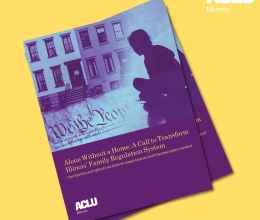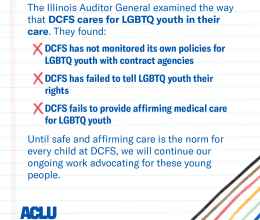
Illinois is not meeting its promise to ensure children and families who receive health care through a new managed care system are receiving the medical, psychiatric, and other health care they need in a timely fashion, according to testimony offered to an Illinois Senate committee today. The Senate Human Services Committee hosted a hearing today to update members on the experience of DCFS youth and families are faring with transition to a managed health care system known as YouthCare.
In testimony offered by the ACLU of Illinois, which has represented children in the care of DCFS through the B.H. litigation for nearly twenty years, the organization noted that while problems with access to health care for DCFS wards did not begin with the transition to YouthCare, the managed care system has not solved longstanding problems.
“Many of Illinois’ foster children simply are not receiving the care that they need at the time when they need it,” Heidi Dalenberg, Director of the Institutional Reform Project, ACLU of Illinois. “That was true before the rollout of the YouthCare plan. It remains true today.”
The ACLU pointed out that some flaws in the YouthCare system and network is creating real harm for children in DCFS care. Ms. Dalenberg related the story of one teen taken to a local emergency room in the midst of a mental health crisis, in true distress. Although all the medical professionals at the hospital agreed that the teen needed to be admitted to a psychiatric hospital, DCFS and YouthCare could not find a hospital for the teen to enter. After ten days, waiting in the emergency room, the youth was determined to be ready to be released – but never was provided the necessary psychiatric care.
“It would be sad if this were the only instance of this harm to a teen,” added Dalenberg. “It is not. We know that in the month of September alone, at least ten other foster children who experienced similar circumstances– being stuck at an emergency room because a placement was not found for them. YouthCare needs to address this today.”
The ACLU also shared results of a project it conducted in recent weeks to test the experience of families with finding care under YouthCare by calling physician offices in Belleville, Peoria and suburban Harvey. The ACLU tests revealed that a family calling a provider’s office for the first time would be able to secure an appointment for a child to see a physician in just 3 out of 10 calls during that first call.
Among other reasons that appointments were not available:
- Phone numbers were out of service;
- Doctor offices had closed;
- Offices indicated that they had never heard of YouthCare;
- Offices said they would not accept YouthCare (in error);
- Offices said that they would not schedule new patients until after the COVID pandemic was ended; and,
- Offices said they needed complete medical records – not in possession of the parents – before scheduling an appointment.
“The network cannot serve children if physicians can’t or won’t respond to the needs of these families. YouthCare and DCFS needs to fix this soon – so that no family gets unnecessarily refused,” said Dalenberg.


